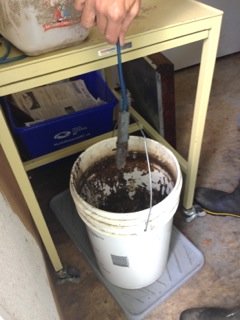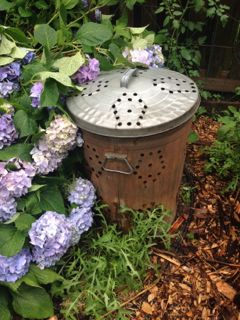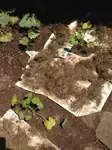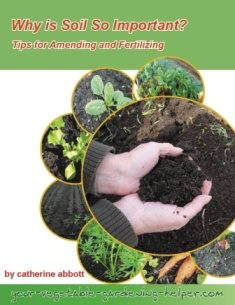Organic Fertilizer Tea
Organic fertilizer tea can be made with compost, animal manure or green matter such as comfrey or stinging nettles. These teas have concentrated nutrients that are beneficial to your garden soil and vegetable plant growth.
I have made these for my own garden and it makes a huge difference in how my veggie plants grow and produce. I recommend everyone take time to add this to your garden to do list.
 Making compost tea
Making compost teaBenefits to Organic Fertilizer
- Makes your compost or animal manure go further especially if you only have a limited amount.
- Gives your soil nutrients that the vegetable plants can then use to boost their growth.
- Can reduce transplant shock when given to young transplants when they are first planted.
- Can control pests, insects and disease on your vegetable plants.
- Using plants that can be a garden intrusion such as comfrey or borage to make an organic fertilizer tea.
RECIPES for Organic Fertilizers
"Compost or Manure" Tea
Fill a bucket or garbage can 1/3 full of fresh compost or animal manure (do not use cat, dog, pig or human waste) and then fill it full of water. Mix well, cover and let is sit overnight.
This makes a rich brown liquid that can be diluted in the watering can or put directly on to your young seedlings, fruiting vegetables or in your containers and hanging baskets.
Once you use all the liquid refill the bucket or garbage can with more water. It can be refilled until the liquid is no longer a rich brown color.
When the tea is not longer the rich brown dump the sludge from the bucket on to your compost pile. Start a new batch of tea some fresh manure or compost.
 Old garbage can can be a great place to make your compost tea.
Old garbage can can be a great place to make your compost tea."Green" Tea
Take a large bucket with a lid and fill it with comfrey, borage, stinging nettles, Lucerne hay, grass clippings or a combination of all of these.
For 1 part of green matter add 10 parts water. Cover with the lid.
When the water is a rich brown or yellowish color it is ready to use. This usually takes a few weeks.
As you use up the liquid keep adding more water until it no longer turns the brown or yellowish color. The sludge at the bottom is great to add to your compost pile or to put directly on your garden beds.
Get more information on growing and fertilizing specific vegetable.
Return from Organic Fertilizer to Organic Vegetable Gardening
Recent Articles
-
Organic Gardening soil amendments - List of material?
Aug 09, 25 10:57 AM
What materials are best used as organic gardening soil amendments? -
Tips for disease control in your vegetable garden
Jul 14, 25 11:15 AM
Easy tips for disease control to keep your vegetable growing its best. -
Joy of vegetable Gardening
Jul 14, 25 11:01 AM
Everything you need to know is right here to have Joy of Vegetable Gardening





